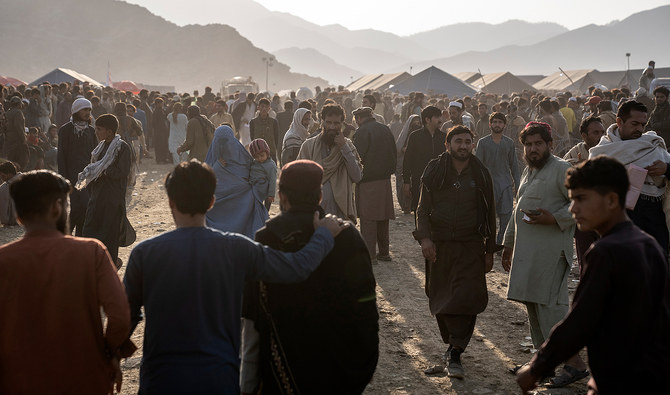ISLAMABAD: About 1.3 million Afghans are expected to return to their country of origin from Pakistan, the UN health agency warned, weeks after authorities began expelling foreigners living in the country illegally.
Thursday’s warning by the World Health Organization came amid such expulsions, despite the onset of cold weather and widespread criticism from international and domestic human rights groups.
Since Nov. 1, police in Pakistan have been going door-to-door to check migrants’ documentation after a deadline for migrants without papers to leave or face arrest. Most of those affected are Afghan nationals.
Pakistan hosts millions of Afghans who fled their country during the 1979-1989 Soviet occupation. The numbers swelled after the Taliban seized power in Afghanistan in August 2021. Pakistan says the 1.4 million Afghans who are registered as refugees need not worry, as their status has been extended until December.
The crackdown has forced about 340,000 Afghans in recent weeks to leave Pakistan after spending years, officials said Friday. Many Afghans who have been in Pakistan for decades say they should be given more time, as they have no home in Afghanistan. Afghans say they do not know how they will start a new life from scratch.
An estimated 1.7 million Afghans were living in Pakistan illegally when the crackdown was launched.
Afghanistan has set up a commission in Kabul to deal with repatriations from Pakistan. Bilal Karimi, the spokesman for the refugee commission of Afghanistan’s Taliban-led administration, said so far 340,608 Afghans have returned.
Currently, the WHO is providing health facilities to Afghans returning through the border crossings at Torkham in northwestern Pakistan and Chaman in the southwest.
In a statement Thursday, the WHO said the “sudden and increased flux of such returnees, along with other related factors, poses significant public health concerns.” It also warned of the risk of disease outbreaks and transmission of wild poliovirus at the points where Afghans are entering the country.
The WHO also appealed for $10 million to provide health services targeting 700,000 Afghan returnees.
“As we welcome back Afghans into the country, it is our collective obligation to public health to ensure that we have systems and resources in place to prevent, prepare for and respond to public health risks,” said Dapeng Luo, WHO Representative in Afghanistan.
The latest development also comes a day after the UN human rights chief Volker Türk said in a statement he was alarmed by reports that the arbitrary expulsion of Afghan nationals from Pakistan has been accompanied by abuse, including ill-treatment, arbitrary arrests and detention, destruction of property and personal belongings and extortion.
Some returning Afghans said they were harassed by Pakistani authorities asking for bribes. One such returnee, Zabihullah, who like many Afghans uses one name, said he spent 28 years of his life in Pakistan.
He said Pakistan police last week raided the home where he lived in the northwest, and he was asked to leave the country. “Police snatched my money. I had to sell my household things to return home along with my family,” he said.
However, Pakistani officials often say that Afghans returning home are being treated fairly.
At a news briefing on Thursday, Mumtaz Zahra Baloch, the spokesperson for Pakistan’s Ministry of Foreign Affairs, said the repatriation of all illegal foreigners, including Afghans, was taking place “in a humane manner.” She said Pakistan would take action against individuals who may be involved in harassment of any individual facing deportation.
More than a million Afghans expected to go back as Pakistan expels foreigners without papers — UN agency
https://arab.news/95t7k
More than a million Afghans expected to go back as Pakistan expels foreigners without papers — UN agency

- The warning by World Health Organization came amid such expulsions, despite the onset of cold weather and global criticism
- Since Nov 1, police in Pakistan have been going door to door to check migrants’ documentation after a deadline for them expired
Saudi Arabia condemns separatist attacks in Pakistan’s Balochistan

- Kingdom says it stands with Pakistan as security forces kill 92 militants in counteroffensive
- Attacks hit multiple districts including Quetta and Gwadar, killing civilians and security personnel
ISLAMABAD: Saudi Arabia on Saturday condemned separatist attacks in Pakistan’s southwestern Balochistan province, expressing solidarity with Islamabad after a wave of coordinated violence killed civilians and security personnel across multiple districts.
In a statement cited by the Saudi ambassador to Pakistan, Nawaf bin Said Al-Malki, the Kingdom said it rejected violence in all its forms and stood with Pakistan as its security forces responded to the attacks.
“The Ministry of Foreign Affairs of the Kingdom of Saudi Arabia strongly condemns the attacks carried out by separatist elements in various areas of Pakistan’s Balochistan province,” he said in a social media message. “The Kingdom of Saudi Arabia renews its firm position rejecting all acts of terrorism and extremism.”
Pakistan’s military said on Saturday its forces killed 92 militants, including three suicide bombers, while repelling coordinated attacks across the southwestern province, following assaults that targeted civilians and law enforcement personnel in several towns, including Quetta, Gwadar, Mastung and Kharan.
The military said 18 civilians, including women and children, were killed in attacks on laborer families in Gwadar and Kharan, while 15 security personnel died during clearance operations and armed standoffs.
Saudi Arabia’s foreign ministry also conveyed condolences to the families of those killed and wished a speedy recovery to the injured, reaffirming its support for Pakistan’s efforts to safeguard stability and security.
Balochistan, which borders Iran and Afghanistan, has faced a decades-long separatist insurgency marked by attacks on security forces, infrastructure projects and civilians, as Pakistan steps up counter-militancy operations in the region.










